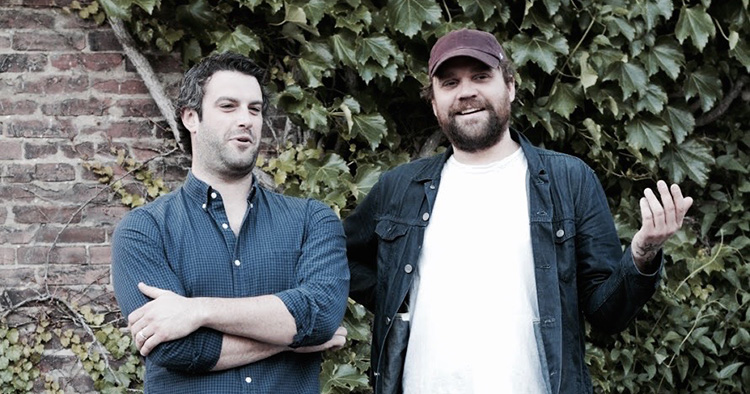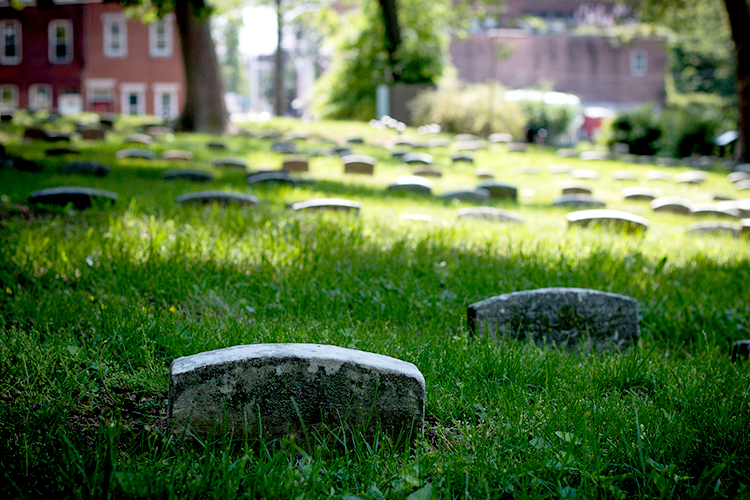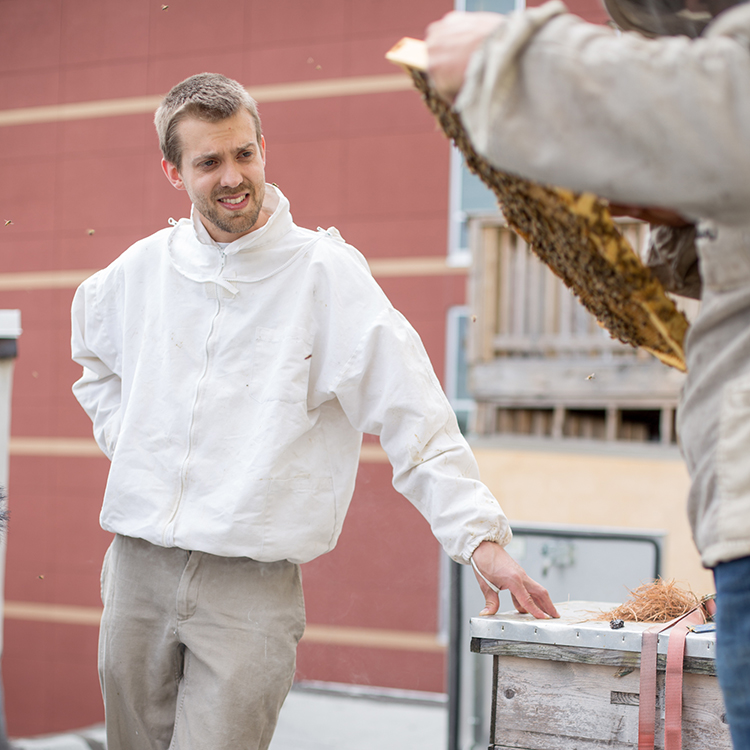Packets of Hope
by Justin Klugh
The first thing you notice about “Please Plant This Book,” a collection of poems by Francis Daulerio with illustrations by Scott Hutchison, is that it is not a book.
It’s eight packets of heirloom seeds, rubber-banded together. The fronts of each packet bare a drawing by the hand of Hutchison, the former lead singer and guitarist of Frightened Rabbit. On the reverse side is a series of verses from writer and teacher Daulerio that evoke flashes of seasons and soil, rain-soaked windows and whistling tea kettles; a flickering set of images pulled from dreams, intersecting parts of dozens of stories.
Seeds are the most minute, but still visible, components of nature. Yet, Daulerio and Hutchison let their book carry so much: the legacy of Richard Brautigan, who wrote the first version of “Please Plant This Book” 50 years ago on packets of carrot and wildflower seeds; their love of the outdoors on a swiftly deteriorating planet; and the mission of preventing suicide. Brautigan took his own life in 1984. Hutchison did as well, just this month, at the age of 36.
“I think,” Daulerio says in an interview, two days before Hutchison’s suicide, “the overall arc of this is to take things that you love and hold onto them for as long as you possibly can.”
Daulerio roosts in what he calls a “random set of houses… Just us and some trees” in Blue Ball, Pa., away from the buzzing lights, sweaty bodies and sticky concourses of the venues in which Frightened Rabbit played when their tours would bring them through Philadelphia.
It was in his forested hideaway that Daulerio began a rough draft of “If & When We Wake” and in October 2013 pursued Hutchison to do the illustrations by sending his band a message through Facebook.
“I said, ‘I’m a huge fan of you guys, and I’m working on a book that I would love it if you illustrated,’” Daulerio recalls. “And I figured, ‘There’s no way in hell he’s ever getting back to me.’ A couple of days later, I had a notification that said, ‘Yeah, here’s my email address. Send me your stuff and we’ll see what we can do.’ Total shot in the dark.”
Hutchison, who attended the Glasgow School of Art, had released a calendar featuring images of what Daulerio calls “weird dudes with beards on them” through Frightened Rabbit’s social media accounts; an output of leftover art school instincts.
“I became disenfranchised about the institution of art school being [to] just [make] work to entertain the people in my class that doesn’t have any relevance to the outside world,” Hutchison explained.
Still, he maintained an openness to find meaningful outlets for his artwork. Daulerio’s book idea was an opportunity to do so, one that jumped out at him when he received the request.
“It’s such a pleasure to re-enter that world for reasons that aren’t the artistic metric of being in art school,” Hutchison expressed. “This is illustration with a purpose, and it contributes to someone else’s work in a collaboration. I was very, very insular in art school; I just made my own work and didn’t really connect with others. But this kind of collaborative method of working has really brought back a lot of the love I had for it before all of it was beaten out of me at art school. Stuff like this lets me step away from the band for a moment and focus on other stuff that I love. It had been a long time since I’d really done anything that was a focused project like this. I think Fran probably expected to get no answer whatsoever. But I think I was pretty quick to get back, wasn’t I?”
“Yeah, I think it was like a day or two,” Daulerio replies.
After their initial communication that year, Frightened Rabbit came through Philadelphia, and Daulerio met Hutchison at the Electric Factory with an unfinished copy of the manuscript. The two sat down to map out how the final product would look. Each poem, flowing with ambiguity that allows a reader to slip in and out seamlessly, is accompanied by Hutchison’s art; simple sketches reflecting the subject matter of the poems and the seeds inside.
“The overwhelming goal was to induce a state of calm,” Daulerio says. “I think it’s easy when talking about heavy, heavy, heavy topics like suicide to lean on the darkness. But the goal of this was to help bring people to a state when they could relax, and be outside and breathe.”
Daulerio drew from his personal experience with weeks—“sometimes months”—of crippling anxiety and depression. “What do I need when I’m there?” he asks. “What brings me back to baseline? That’s what I was thinking about when I wrote this. Obviously, these poems aren’t therapy or medicine; I’m not healing anybody with this, but what can I do to just help somebody calm down a little bit if they are having a rough go at it?”
Daulerio had been initially introduced to Brautigan through one of the students in his creative writing class. “This book is weird, I think you’d like it,” they told him.
It was “The Pill Versus the Springhill Mine Disaster,” a collection of 98 of Brautigan’s poems, in which the titular work compares his lover’s birth control pills with an infamous series of mine explosions in Nova Scotia.
“I totally fell in love with it,” Daulerio says fondly.
“I’m not as into Richard Brautigan as Francis is,” Hutchison said, “but in becoming familiar, I’ve really come to enjoy it.”
Brautigan’s most famous works, “Trout Fishing in America,” and “In Watermelon Sugar,” continue his overall usage of ambiguous narrative elements and abstract imagery through the lens of black comedy and satire. It is “Trout Fishing” and another work, “Revenge of the Lawn,” which Brautigan’s daughter, Ianthe, says best allow her to “hear [her father’s] voice on the page,” after his suicide in 1984.
Daulerio was able to get Ianthe Brautigan to pen the foreword to “Please Plant This Book,” for which the proceeds benefit the American Foundation for Suicide Prevention. She used the space to relate the heartbreak in the fallout of her father’s suicide, wishing she “…could just pick up the telephone, wait for him to come on the line, and share something funny or perhaps relate a story about his granddaughter, whom he would have adored.”
Brautigan’s original work contained passages on California native flowers, carrots, lettuce, calendula, squash, shasta daisy, parsley and sweet Alyssum royal carpet. The book, which preceded “The Pill Versus the Springhill Mine Disaster” in his catalog, found a way of capturing the imaginations of crowds with its unorthodox medium and the fact that it was freely distributed. An email posted on a website dedicated to Brautigan’s work reflects the popularity of “Please Plant This Book” on a college campus in 1969—once people figured out what it was:
I set up a table and started yelling “Free books. Free books.” Some people were immediately attracted but many of the staff personnel looked questioningly at me when they first went into the cafeteria. They might have thought I was handing out pornography or left-wing radical political material. But, after having seen what some of their friends had gotten, they mobbed the table on the way out. “Please, for my grandchildren, for my neighbors.” One minister wanted (and got) 40 copies for his congregation. Within two hours all copies were gone. It was one of the best days of my life.
Brautigan was a writer whose work has been characterized by themes that some debate are either optimistic or cynical on the fate awaiting Earth and humanity. In composing “Please Plant This Book,” Daulerio and Hutchison bring together two sides of Brautigan’s work: the brutality of an unknown future and the flowing verse with which to convey it.
There is still room for us here, Daulerio writes on a packet
of Henry Wilde sunflower seeds. Do not let your eyes adjust to the darkness.
Hutchison’s accompanying illustration shows a sun with a human face; tired, expressionless, with the slightest hint of a smile.
“The worst thing that I envisioned happening was something [being] misinterpreted to come across as insensitive or offensive or making light of a situation that there’s no room for making light of,” Daulerio explains. “I definitely was more careful with these poems than I am with my regular writing. I didn’t want to get into a realm that could be misinterpreted.”
“It’s funny that you said that, Fran,” Hutchison replies. “That you tried not to be insensitive when writing this. I would say there’s a lot to be gained from being brutally honest.”
Hutchison slipped away from his hotel in South Queensferry, Edinburgh, Scotland, at 1 o’clock in the morning on Wednesday, May 9. His death was confirmed the following day.
One of life’s unfair inevitabilities is that loss sprouts intrusively into parts of our lives that had once felt impenetrable to suffering, leaving us with what remains to get us through. And all we want at the end of the day is exactly what Ianthe Brautigan writes in the foreword of “Please Plant This Book”: to punch in a number and hear the voice of someone we’ve lost.
It is common to be told that, in many ways, someone who makes an impact is never really gone. But regardless, another life is now tragically departed from an earth that so benefited from their creations, their words, their passions. But one thing we can do in their absence is plant the seeds that keep their memory alive.







